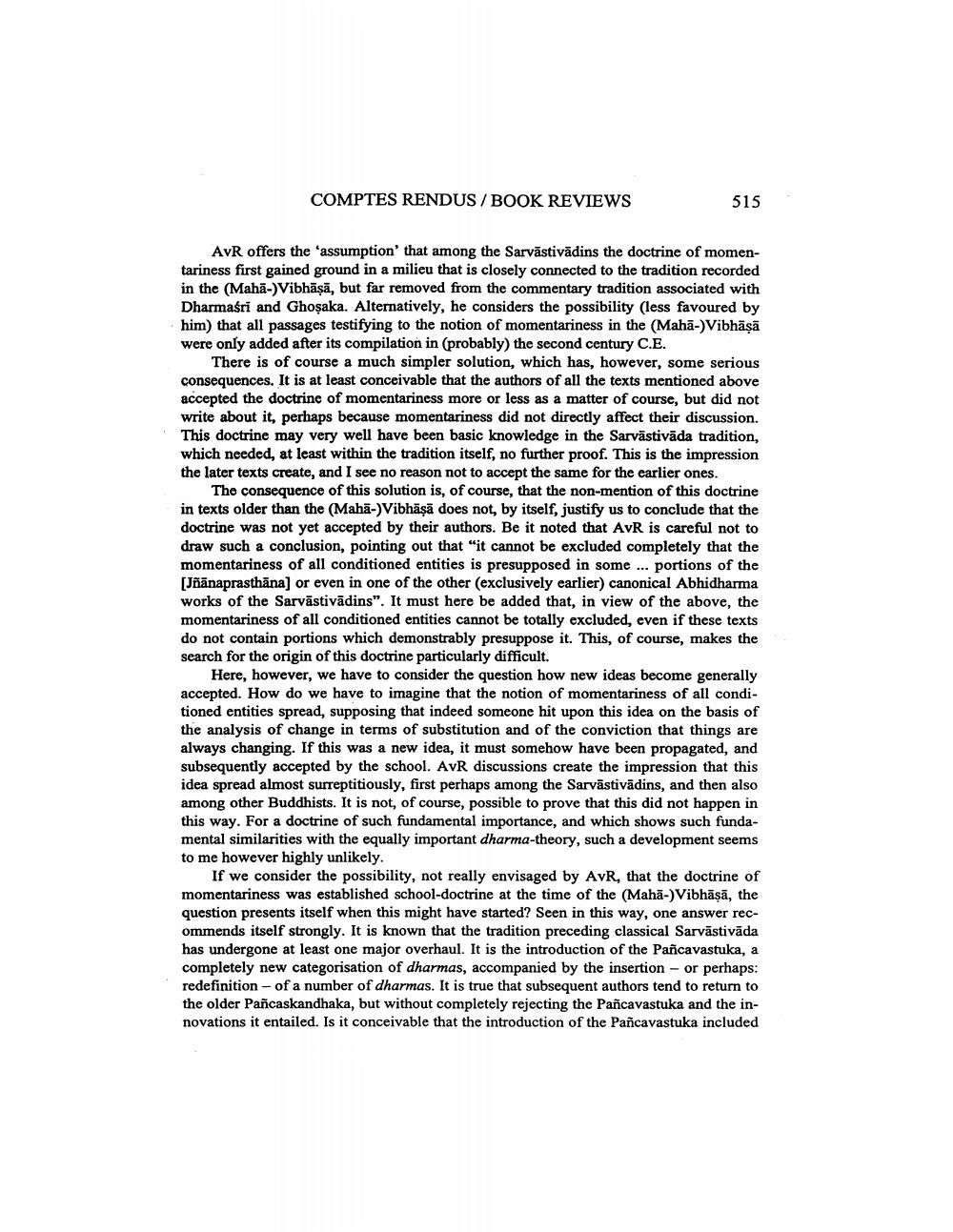Book Title: Buchbesprechungen Comptes Rendus Book Reviews Author(s): Peter Schreiner Publisher: Peter Schreiner View full book textPage 3
________________ COMPTES RENDUS / BOOK REVIEWS 515 AVR offers the 'assumption that among the Sarvāstivādins the doctrine of momentariness first gained ground in a milieu that is closely connected to the tradition recorded in the (Mahā-)Vibhāṣā, but far removed from the commentary tradition associated with Dharmasri and Ghosaka. Alternatively, he considers the possibility (less favoured by him) that all passages testifying to the notion of momentariness in the (Mahā-)Vibhāsā were only added after its compilation in (probably) the second century C.E. There is of course a much simpler solution, which has, however, some serious consequences. It is at least conceivable that the authors of all the texts mentioned above accepted the doctrine of momentariness more or less as a matter of course, but did not write about it, perhaps because momentariness did not directly affect their discussion. This doctrine may very well have been basic knowledge in the Sarvästivāda tradition, which needed, at least within the tradition itself, no further proof. This is the impression the later texts create, and I see no reason not to accept the same for the earlier ones. The consequence of this solution is, of course, that the non-mention of this doctrine in texts older than the (Mahā-)Vibhāşā does not, by itself, justify us to conclude that the doctrine was not yet accepted by their authors. Be it noted that AVR is careful not to draw such a conclusion, pointing out that "it cannot be excluded completely that the momentariness of all conditioned entities is presupposed in some ... portions of the [Jñānaprasthāna) or even in one of the other (exclusively earlier) canonical Abhidharma works of the Sarvāstivādins". It must here be added that, in view of the above, the momentariness of all conditioned entities cannot be totally excluded, even if these texts do not contain portions which demonstrably presuppose it. This, of course, makes the search for the origin of this doctrine particularly difficult. Here, however, we have to consider the question how new ideas become generally accepted. How do we have to imagine that the notion of momentariness of all conditioned entities spread, supposing that indeed someone hit upon this idea on the basis of the analysis of change in terms of substitution and of the conviction that things are always changing. If this was a new idea, it must somehow have been propagated, and subsequently accepted by the school. AvR discussions create the impression that this idea spread almost surreptitiously, first perhaps among the Sarvāstivādins, and then also among other Buddhists. It is not, of course, possible to prove that this did not happen in this way. For a doctrine of such fundamental importance, and which shows such fundamental similarities with the equally important dharma-theory, such a development seems to me however highly unlikely. If we consider the possibility, not really envisaged by AVR, that the doctrine of momentariness was established school-doctrine at the time of the (Mahā-) Vibhāsā, the question presents itself when this might have started? Seen in this way, one answer recommends itself strongly. It is known that the tradition preceding classical Sarvāstivāda has undergone at least one major overhaul. It is the introduction of the Pancavastuka, a completely new categorisation of dharmas, accompanied by the insertion - or perhaps: redefinition - of a number of dharmas. It is true that subsequent authors tend to return to the older Pancaskandhaka, but without completely rejecting the Pancavastuka and the innovations it entailed. Is it conceivable that the introduction of the Pancavastuka includedPage Navigation
1 2 3 4 5 6 7 8
